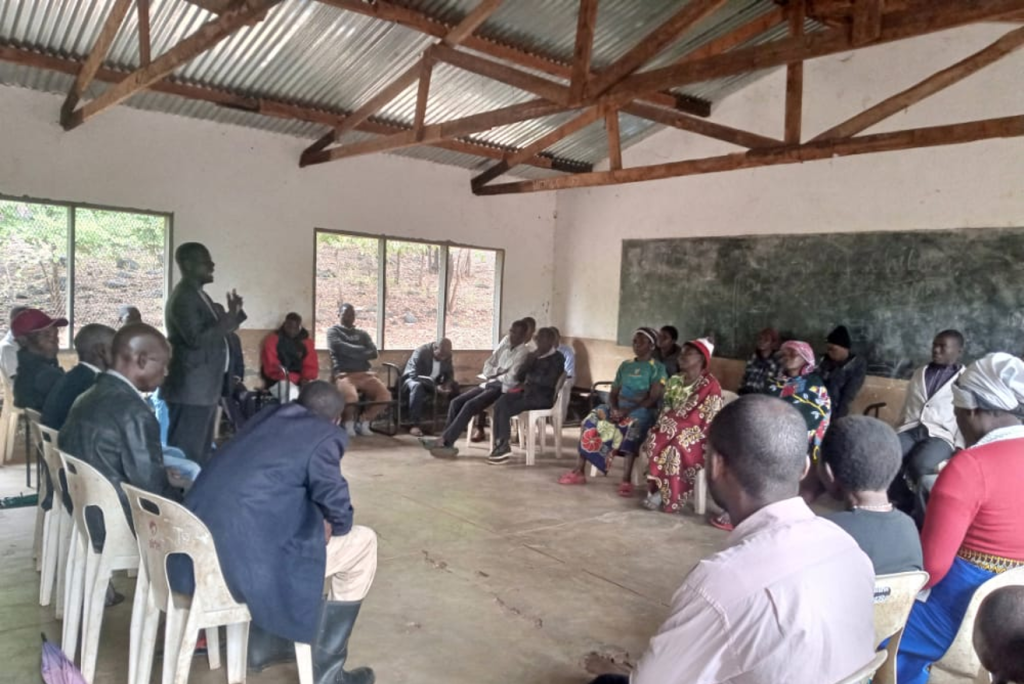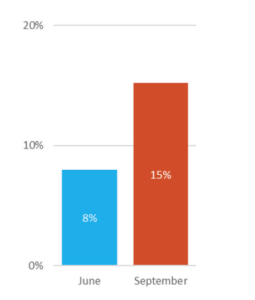Improving COVID-19 Vaccine Demand with Trusted, Community-Based Vaccinators
Vaccination Action Network: Local Solutions to Catalyze Change
 Community Health Workers (CHWs) play a critical role bridging the gap between local communities and public health authorities, providing communities with trusted health information and services and providing authorities with local data and insights. CHWs must be both the expert and living example in times where uncertainty may persist. They are often the first to receive a vaccine in the presence of members of their community, demonstrating their commitment to community health.
Community Health Workers (CHWs) play a critical role bridging the gap between local communities and public health authorities, providing communities with trusted health information and services and providing authorities with local data and insights. CHWs must be both the expert and living example in times where uncertainty may persist. They are often the first to receive a vaccine in the presence of members of their community, demonstrating their commitment to community health.
Incorporating CHWs into COVID-19 vaccination initiatives has been a key strategy in many countries to respond to concerns and misinformation. The recruitment, training, and support of these CHWs, however, varies widely between countries and regions, impacting their success in driving COVID-19 vaccine demand.
Building Trust Through Local Vaccinators
Malawi’s community health networks are powered by Disease Control and Surveillance Assistants (DCSAs), whose roles include providing health education, conducting routine immunization, and supplying primary clinical delivery. Recruiting and training DCSAs from the catchment areas in which they live builds upon the trust and acceptance they already have to encourage vaccination. Prior to the COVID-19 pandemic, DCSAs received intensive training on communicable disease prevention and treatment.
As Malawi began to vaccinate against COVID-19, DCSAs were key partners in vaccinating community members and conducting outreach, according to Fred Mwandida, District Immunization Officer, Ministry of Health Malawi, Nsanje district. As community members themselves, DCSAs were well-placed to not only vaccinate fellow residents but were also able to monitor attitudes toward vaccination and identify myths and misconceptions being shared amongst the community.
Using their standard training as a foundation, Malawi was able to quickly prepare DCSAs with up-to-date information on COVID-19, training for COVID-19 vaccine delivery, and support for effectively addressing risk communication. Providing accurate information and risk communication to communities during the pandemic was a significant challenge in many communities, and the DCSAs were equipped with the latest information on COVID-19 and the vaccine and prepared to respond to community concerns through personal connections and community outreach.

Leveraging Existing Relationships to Drive Demand
The DCSAs began the process of community outreach by engaging teachers, religious leaders, school administrators, and other influential community members they already knew, connecting to persuade them that vaccination was both necessary and safe.
For example, DCSA vaccinators shared information at their religious institutions, addressing the concerns of their fellow congregants and working with their religious leader to arrange on-site vaccination services.
Similarly, as Malawi expanded COVID-19 vaccine eligibility to children aged 12 to 17 in early 2022, DCSAs reached out to the schools they or their children attended to strengthen their relationships with the school administration and encourage teachers to recommend vaccination to parents. In some circumstances, they vaccinated teachers in front of their classes to help ease concerns and drive demand for this newly eligible group.
From Implementation to Impact
Health officials in Nsanje district also built on the pre-existing My Village My Home (MVMH) approach to advancing COVID-19 immunization efforts. MVMH is a tool that encourages community ownership of vaccination efforts by publicly tracking and sharing immunization status. While MVMH was originally developed to improve routine immunization coverage, it proved an effective strategy for COVID-19 vaccination, as DCSA vaccinators, community leaders, and volunteers were already familiar and comfortable with the approach, needing only the COVID-19-specific vaccination training.
The MVMH tool encouraged a team-based approach. DCSA vaccinators, community leaders, and volunteers worked together to track vaccinations and conduct outreach. As a team, they visited those who had not been vaccinated against COVID-19, listened to their concerns, provided accurate information, and – in most cases, according to Mr. Mwandida – vaccinated them.

A team of supervisors, including Mr. Mwandida, periodically visited the teams working in these communities to provide additional encouragement. Mr. Mwandida reminded partners that, “it takes time for a social norm to be established. But by continuing to engage, more and more are vaccinated, and others are willing to listen and do the same.”
Accelerating COVID-19 Vaccine Uptake
This approach to community outreach through trusted CHWs has shown great success in the Nsanje district – as of September 2022, 34% of eligible district residents had been fully vaccinated against COVID-19 and over 70% have received their first dose, numbers significantly higher than many rural districts in the country.

Mr. Mwandida is confident that vaccination numbers will continue to increase, saying:
“It is possible to get everyone vaccinated. I am speaking about my experience here, where several villages have been able to vaccinate most people. The villages themselves were at the forefront of urging their communities to get vaccinated, understanding the importance of the vaccine. In the beginning, so many people lined up for the vaccines causing a shortage in supply because everyone was willing. Today, we must encourage the catchment communities to vaccinate. If we take our time and engage with communities through trusted sources, we can have high vaccination coverage in not only Malawi, but Africa and the rest of the world.”
 Contributor
Contributor
This story was shared by Fred Mwandida, District Immunization Officer, Ministry of Health Malawi. Mr. Mwandida has helped Nsanje district successfully roll out COVID-19 vaccinations by building trust among communities. He has previously worked as a District Health Implementation Planning Officer, Integrated Disease Surveillance and Response Officer, Hospital Management Information System Officer, Food and Safety Hygiene Officer, HIV Officer, and National Publicity Secretary for Malawi’s Environmental Health Association.
Vaccination Action Network
The Vaccination Action Network (VAN) is an Africa-led action-oriented collaborative that brings together vaccination leaders and senior public health officials to solve the toughest challenges in improving COVID-19 vaccine demand and uptake across Africa. VAN provides a space for learning and peer exchange among immunization practitioners, focusing on demand-related challenges, best practices, and lessons learned that are specific to the local context. Local Solutions to Catalyze Change share interventions implemented by VAN members to improve COVID-19 vaccine uptake.

